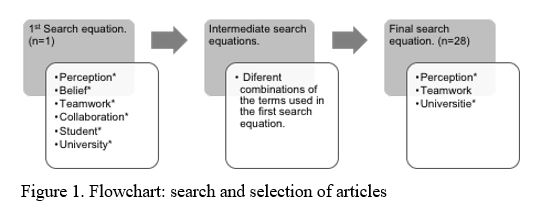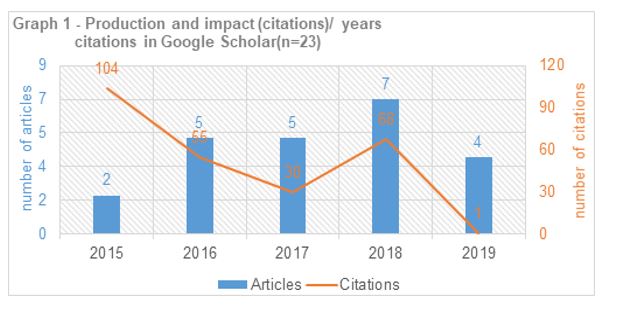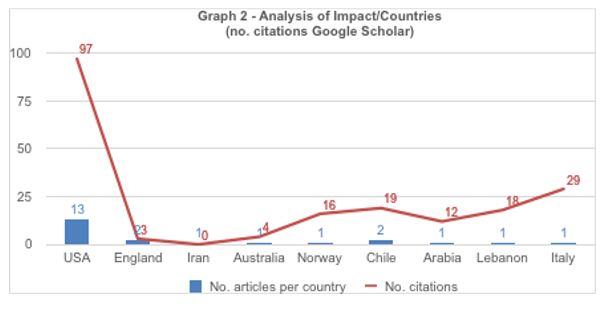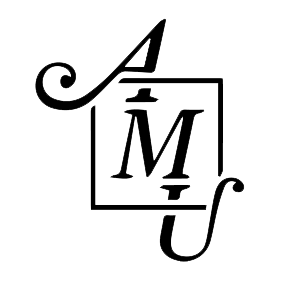María del Carmen Gervilla-Navarro¹, Beatriz Morón-Cívico¹.
1. Facultad de Medicina, Universidad de Granada (UGR).
TRANSLATED BY:
Nuria López-Martín², Raquel Fernández-Polo², Andrea Martínez-Mellinas², Mercedes Barrera-Bautista², Daniela
Sánchez-Sánchez², Javier Saldaña-Martínez².
2. Faculty of Translation and Interpreting, University of Granada (UGR).
Teamwork is an increasingly important aspect in educational, employment and social contexts. This narrative review, which aims at analysing the university students’ perceptions of teamwork, includes the results of the 23 articles about this topic found in the MEDLINE database, between 2015 and 2019. Taking into account the objective of this review, these criteria were applied in accordance with the PICOT strategy. Furthermore, an analysis of these publications in relation to their country of origin and impact is included. The dynamism of employment contexts requires the development of specific essential skills, such as those needed for effective teamwork. The scientific articles analyzed suggest that university students generally consider the training on teamwork skills to be positive, when this training used inter-professional education programs and other new methodologies. For the people who participated in these experiences, this means not just a greater appreciation of this kind of multidisciplinary project activities, but also a tool for the learning about another profession’s functions and responsibilities, or for being able to cope with work-related stress in a better manner. Considering the most relevant information and based on the educational framework within the European Higher Education Area, the importance of activating the necessary processes to enable the implementation of this kind of content in university studies to a greater extent is reflected.
Keywords: university students, teamwork, perception.
INTRODUCTION
Developing and training skills such as adaptability, ability to solve problems and teamwork is necessary considering the dynamic nature of professional fields (1). Teamwork involves a process covering much more than the sum of tasks carried out by each participant, because it means activating reciprocity, dialogue and exchange of ideas, as well as mutual respect or coordination, among others (1). The phase of education is decisive for learning processes as it can offer contents and experiences that combine with the concept of teamwork and favor students’ perceptions, attitudes, values and positive performance (1). As revealed in the great current bibliography based on the European Higher Education Area, the organizational transformation of university education, of curriculum design and their implementation is a priority (2). Universities must undertake certain actions to achieve a high-quality education, which aims at staffing universities with professionals who have a strong sense of social value (3). Consequently, updating the university syllabuses so that they lead to training future professionals and other issues is of great importance (2).
This narrative review responds to the growing interest of this topic, and to the need to perform a more in-depth work on this topic due to the lack of implementation and the heterogeneity of perceptions identified in the literature. It was preliminarily performed according to the “PICOT” strategy, which consists of the following elements:
- Study population: University students.
- Intervention or exposure to be evaluated: Exposure to teamwork.
- Comparison: among students.
- Outcome of the study.
- Time of publication: In this case, the time of publication corresponds to the five last years.
As mentioned above, the information search and the selection of the articles is focused on the importance of teamwork skills training in the university educational field, as well as on the perceptions collected of the different experiences in which teamwork had been put into practice.
METHODS
Literature search procedure
The database chosen for this narrative review is MEDLINE. Firstly, a search with the following related terms was made: perception, belief, teamwork, collaboration, student, university. Each one was entered into the search box followed by the symbol “*”, so that the search engine would recognize all possible combinations. Since no results were obtained with this formula, several searches were carried out with different combinations of these terms, trying to obtain the one that offered the best results. For this, the number of results was taken into account, as well as their adequacy, according to the topic under review. In this sense, titles and summaries were reviewed. Finally, the following search equation was made: perception*, teamwork, universitie*. Twenty-eight articles were found with this search, and their titles and summaries were again analyzed with the aim of assessing the extent to which the content was in line with the objective of the narrative review. After this process, it was resolved that five of them did not provide enough information of interest to be included, so they were dismissed from the total amount of results. According to these criteria, the sample is definitively composed by 23 articles. (See “Figure 1. Flowchart- Search and selection of articles”).

Review
General context of teamwork in the healthcare field
In services and high-quality care, inter-professional teamwork has special significance, understood as work in which people from different professions intervene and interact (4). Although the majority of the students share this same perception, there is also a group who states that their university does not seem to show that it is important in their syllabus (5). In order to improve the health of individuals and populations, a transformation process of the university syllabus is being developed to ensure that higher education encompasses the knowledge of health systems (6). This includes the population’s health, health policy, high-value care, inter-professional teamwork, leadership, quality improvement, and patient’s security (6). Although time is an inherent factor in any transformative process, there have already been improvements in the acquisition of teamwork skills in the students, as well as some positive evaluations from the university community (7).
Accordingly, it is suggested that having participated in team training constitutes a remarkable difference in terms of skills to perform team tasks in a productive manner. One aspect especially highlighted is the positive impact of communication on achieving improvements with regard to planning and organization, on assimilating and managing the dynamics of the team and on responding better to stress (7). Under different stress conditions and training methods, the team effect plays an important role, both in the multitasking and in the coordination and performance level of the team, reflected in perceptions of satisfaction and confidence in relation to group work (8).
However, although these contents are increasingly incorporated into the syllabus and the considerations are positive in general, there also are negative perceptions identified in some aspects or contexts where the experiences reviewed were practiced (9). For example, the perceptions are negative when teamwork involves an unequal participation by some members, or when it involves assessing the fellows’ performance, which may have future consequences on the relations between the members or in the collaborative environment. In other words, clearly assessing the fellows to stimulate open discussion is perceived as a threatening factor and teams prefer other assessment methods (9). Furthermore, although there is clear evidence supporting the viability of implementing this knowledge at the curricular level in order to value the contributions of inter-professional experiences from the students, it is also true that it is necessary to improve the structure of the syllabus to this respect (10). For instance, it is suggested that inter-professional experience is reinforced through collective and contextualized cases’ solutions (10).
Inter-professional education experiences
The inter-professional education (IPE) provides opportunities to learn about the role and responsibilities of other professions, as well as the practical development of communication and teamwork skills (11). Deficiencies in the understanding developed in the roles, responsibilities and fields of action of different professions are often detected. For this reason, the identification and approach of these misperceptions may favor the professional decision-making based on realistic information, an improvement in group functionality and a more positive impact on patient care (12). An important aspect is that IPE interventions do not only include in-class sessions, but also real patient care experiences within inter-professional teams (13). In other cases, inter-professional care simulations accompanied by personal reflection exercises were considered to be of assistance in order to promote and develop the competencies of the Inter-professional Education Collaborative Panel’s competencies for IPE (14). Simulation scenarios can also provide information on shared understanding, perceptions of the level of effectiveness and organizational performance in patient care (15). In one of the studies, chronically ill patients acted as mentors with the objective of increasing the impact of the experiences of this type of learning, in favor of a better coordinated inter-professional care (16).
A study based on the development, implementation and evaluation of an inter-professional team learning elective course to determine the knowledge acquired, confirms the existence of changes in attitude towards IPE and towards the general satisfaction, improving undergraduates’ preparation and perception of inter-professional learning, communication skills and teamwork, although a statistically significant trend was not detected in all cases (17). Another study carried out in conjunction with the Interdisciplinary Education Perception Scale (IEPS) and conducted before and after the training, according to observational learning and practice, shows statistically significant improvements in the general attitudes of undergraduates and a positive influence on the understanding of collaborative work (18). In the analysis of another formative experience, emotional activation and learning results were reported in the domains of self-concept and stress management in the understanding of the leadership role, in the knowledge about teamwork and in terms of communication skills in the group. This is all to say that undergraduates valued the obtention of information related to communication, work with peers and leadership so much that they believed they could be better leaders and/or members of the team when having completed the whole course (4). It is also of interest that student’s perceptions of their training for inter-professional learning may be generally favorable before the exposure, but differences between genders – greater professional identity in women than in men – and between professions were noticed. Notwithstanding, after participation in IPE, a greater readiness for inter-professional learning and less differences between genders and professions were observed (19).
The different healthcare fields have progressively recognized the importance of the IPE system and more disciplines are gradually counting on its application (11). In an IPE forum based on the debate of general case scenarios, it was concluded that there was a statistically significant increase relative to the preparation for inter-professional learning, perceived as a moderately effective system to introduce undergraduates to other professions within the health sector and to favor greater knowledge of different identities. However, the assignment of specific cases to a smaller group of professions registered a rise in perceptions associated with the need to work with other professionals (11). Thus, when planning an IPE experience, it is suggested that teaching staff focus preferentially on intentional groupings of professions in order to reflect on the social context of health teams, so that the whole undergraduate group can fully participate and experience shared learning (11). It has also been identified that syllabus must be designed taking into account that self-perceived communication and teamwork skills can represent a significant negative predictor of negative attitudes towards IPE, as it can be particularly difficult for those who do not start from a condition of confidence in their communication skills and/or towards the effectiveness in group work (20). So that the sharing of IPE-oriented information results in greater undergraduate’s confidence and understanding of competencies, an effective mechanism could be to incorporate ethical case formation, based on a collaborative pedagogy methodology (21). The need to evaluate the impact of IPE on the learning results is an obvious matter, but it is also necessary to evaluate future performance within inter-professional teams (10), as well as the impact on the patient health and wellbeing (22). In a study carried out with a monitoring focus group consisting of ten mentors, high levels of satisfaction when working with inter-professional students’ teams were noticed. Likewise, a substantial progress in the management of health conditions and in the improvement of the general health status were detected (22).
Team-based learning as new methodology
Team-based learning (TBL) is an emerging teaching and active learning strategy considered to be useful in educational fields, not only regarding teamwork, but also critical thinking, knowledge application and collaboration (23). Most of the time, lessons are based on projects and team tasks for the resolution of practical case studies that undergraduates will probably have to deal with in the social and labour environment (24). According to one of these articles, it has been observed in terms of learning that university students with teamwork experience score higher in TBL than those who had previously been little involved with such experiences (24). The students perceived this implementation to be positive. More specifically, they state that it implies good results in the evaluated domains of reaction, learning and behavior, which means this system improves perceptions about teamwork (24). For example, good results can also be achieved if TBL is combined with reading and laboratory works (25). On the other hand, improvements in the perceptions associated with the different educational fields are stood out as it is considered they offer new opportunities to practice the dynamic nature of group settings, which are effectively reflected on the academic performance (26). TBL is defined as a partially new and suitable method of mutual learning for the development of teamwork. However, it requires good management skills in order to obtain highly effective results (26).
All these studies were mostly published in the USA, although there are also authors from other countries who are interested in this subject. The first two articles were published in 2015 (see “Graph 1 – Production and impact (citations)/years”), with a good impact factor measured by their “number of citations” in “Google Scholar”. In the following years, although the number of publications about this subject has grown, citations decrease, with a small positive increase in the number of articles and citations in 2018. Articles released in 2019 could not be analyzed due to their recent publication. If we analyze the impact according to the background of the article, not only the impact of those published in the USA should be highlighted (here we find the highest production), but also the impact of those published in countries like Norway, Chile, Arabia, Lebanon and Italy. Despite these have a lower production, they are cited more than 10 times (see Graph 2 – Analysis of Impact/Countries”).


CONCLUSIONS
The adequacy of education systems for the development of active inter-professional experiences based on practical reality, such as IPE, and for the use of innovative learning methodologies or strategies, such as TBL, is an issue that requires a better approach so that University studies meet the undergraduates’ formative needs in a more complete and coherent manner. These are the results despite the general methodological restrictions of the different studies analyzed, as most of the issued or measured perceptions reflect positive performances with the implementation of these actions and experiences. This being the case, university education must follow this direction in order to optimize its contribution to those processes that involve this learning modality, making it possible for future professionals to work better when interacting with any social and labour environment. This should be understood, among other aspects, as part of the universities’ responsibility and commitment to quality assurance in a teaching and formative context. Therefore, this issue urges the development of the necessary mechanisms so that the planning and implementation of these contents can be modified.
STATEMENTS:
Acknowledgements
This paper is part of the Teaching Innovation Project coordinated between the Faculty of Medicine and the Faculty of Translation and Interpreting of the University of Granada (UGR), within the framework of the FIDO Plan 2018-2020 of the UGR (code 563).
Ethical concerns
This paper did not require the approval of any ethics committee.
Conflicts of interest
The authors of this paper declare no conflicts of interest.
Funding
No funding was received for the production of this paper.
REFERENCES
- Ricolfe JSC, Pérez CE. Análisis de la percepción de las competencias genéricas adquiridas en la universidad. Revista de educación 2013;362:535-561.
- Dieste SA, López MR, Martín MRR. Percepciones de Estudiantes Universitarios sobre una Evaluación Formativa en el Trabajo en Equipo. Revista Iberoamericana de Evaluación Educativa 2019;12:175-192.
- Noriega JÁV, Nénniger EHE, Munguía LCA. Percepción de estudiantes universitarios sobre importancia y realización de competencias genéricas. Revista de educación y desarrollo 2010;15:47-54.
- Castillo-Parra S, Oyarzo Torres S, Espinoza Barrios M, Rojas-Serey AM, Maya JD, Sabaj Diez V, et al. The implementation of multiple interprofessional integrated modules by health sciences faculty in Chile. Journal of Interprofessional Care 2017;31:777-780.
- Gonzalo JD, Caverzagie KJ, Hawkins RE, Lawson L, Wolpaw DR, Chang A. Concerns and Responses for Integrating Health Systems Science Into Medical Education. Academic Medicine 2018;93:843-849.
- Tamayo M, Besoaín-Saldaña A, Aguirre M, Leiva J. Teamwork: relevance and interdependence of interprofessional education. Rev Saude Publica 2017;51-39.
- Zeeni N, Zeenny R, Hasbini-Danawi T, Asmar N, Bassil M, Nasser S, et al. Student perceptions towards interprofessional education: Findings from a longitudinal study based in a Middle Eastern university. Journal of Interprofessional Care 2016;30:165-174.
- Pogge E. Evaluation of an interprofessional team-based learning nutrition and lifestyle modification course. Journal of Interprofessional Care 2016;30:248-250.
- Huitt TW, Killins A, Brooks WS. Team-based learning in the gross anatomy laboratory improves academic performance and students’ attitudes toward teamwork. Anatomical Sciences Education 2015;8:95-103.
- Jakobsen RB, Gran SF, Grimsmo B, Arntzen K, Fosse E, Frich JC, et al. Examining participant perceptions of an interprofessional simulation-based trauma team training for medical and nursing students. Journal of Interprofessional Care 2018;32:80-88.
- Obad AS, Peeran AA, Shareef MA, Alsheikh WJ, Kalagi DA, AlAmodi AA, et al. Assessment of first-year medical students’ perceptions of teaching and learning through team-based learning sessions. Advances in Physiology Education 2016;40:536-542.
- Rosenman ED, Dixon AJ, Webb JM, Brolliar S, Golden SJ, Jones KA, et al. A Simulation-based Approach to Measuring Team Situational Awareness in Emergency Medicine: A Multicenter, Observational Study. Academic Emergency Medicine 2018;25:196-204.
- Wellmon R, Baumberger-Henry M, Colby N, Knauss L, Fletcher P. Changing Student Attitudes Toward Interprofessional Learning and Collaboration: Evidence for the Effectiveness of Partnering with Healthcare Mentors in the Academic Setting. Journal of Allied Health 2017;46:205-212.
- Simko LC, Rhodes DC, McGinnis KA, Fiedor J. Students’ Perspectives on Interprofessional Teamwork Before and After an Interprofessional Pain Education Course. American Journal of Pharmaceutical Education 2017;81:104.
- Hickey EL, Dumke EK, Ballentine RL, Brown BL. Prospective health students’ perceptions of the pharmacist role in the interprofessional team. Journal of Interprofessional Care 2018;32:250-253.
- Thompson BM, Bratzler DW, Fisher MJ, Torres A, Faculty E, Sparks RA. Working together: Using a unique approach to evaluate an interactive and clinic-based longitudinal interprofessional education experience with 13 professions. Journal of Interprofessional Care 2016;30:754-761.
- Xu J, Montague E. An experimental study on individual and group affect in multi-tasking teams. Ergonomics 2019;62:376-390.
- Rajati F, Sharifirad G, Babakhani M, Mohebi S. The effect of team-based learning on public health students’ educational outcomes. Journal of Education and Health Promotion 2018;7:140.
- Hanley A, Kedrowicz AA, Hammond S, Hardie EM. Impact of Team Communication Training on Performance and Self-Assessment of Team Functioning during Sophomore Surgery. Journal of Veterinary Medical Education 2019;46:45-55.
- Manspeaker SA, Donoso Brown EV, Wallace SE, DiBartola L, Morgan A. Examining the perceived impact of an ethics workshop on interprofessional values and teamwork. Journal of Interprofessional Care 2017;31:628-637.
- Roberts LD, Davis MC, Radley-Crabb HG, Broughton M. Perceived relevance mediates the relationship between professional identity and attitudes towards interprofessional education in first-year university students. Journal of Interprofessional Care 2018;32:33-40.
- Kazory A, Zaidi Z. Team-Based Learning Activities for First-Year Medical Students: Perception of the Learners. Southern Medical Journal 2018;111:525-529.
- Umland E, Collins L, Baronner A, Lim E, Giordano C. Health Mentor-Reported Outcomes and Perceptions of Student Team Performance in a Longitudinal Interprofessional Education Program. Journal of Allied Health 2016;45:219-224.
- Lairamore C, Morris D, Schichtl R, George-Paschal L, Martens H, Maragakis A, et al. Impact of team composition on student perceptions of interprofessional teamwork: A 6-year cohort study. Journal of Interprofessional Care 2018;32:143-150.
- Biesma R, Kennedy M, Pawlikowska T, Brugha R, Conroy R, Doyle F. Peer assessment to improve medical student’s contributions to team-based projects: randomised controlled trial and qualitative follow-up. BMC medical education 2019;19:371.
- Zanotti R, Sartor G, Canova C. Effectiveness of interprofessional education by on-field training for medical students, with a pre-post design. BMC medical education 2015;15:121.
AMU 2020. Volumen 2, Número 1
Fecha de envío:
16/03/2020
Fecha de aceptación:
06/04/2020
Fecha de publicación:
29/05/2020
